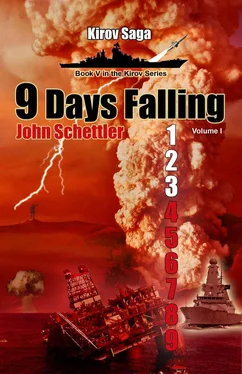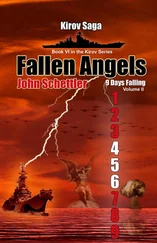“I understand,” Volsky seemed satisfied. “I will see that they are very safe. In the meantime, something you have said here tonight has given me a little hope. As you may know, we have not heard from Kirov since the eruption of that volcano out east.”
“Oh? No I was not informed. They no longer tell me everything now that I’m retired, nor do I have room for very much more in this weary old head of mine. What are you are thinking about this eruption?”
“It was enormous,” said Volsky. “Probably a thousand times bigger than our Tsar Bomba. You have just told me such events can cause time displacement. My fleet is missing, and for an Admiral that is a very disheartening thing. I was thinking, perhaps…”
“I see,” said Kamenski. “I suppose we will just have to wait and see what we find out. Yes, Mother Nature can throw fits of her own that make our own efforts seem puny. We have thought of this, of course, and that is why most active volcanic sites are monitored very carefully. Thus far the eruptions we have investigated have not produced these effects. These eruptions do not involve nuclear fission. Something about that seems to be a very sharp knife when it comes to the fabric of space-time. Volcanic eruptions release much more energy, but it is geothermic, not nuclear. Though I will qualify that by saying that we’ve seen nothing on this scale since Mt. Tambora erupted in 1815. Perhaps the size of the eruption in the Kuriles will make some difference here.”
Volsky nodded, his eyes dark with both sadness and fatigue. It was an hour past midnight, and then there came a soft knock on the outer door.
“Excuse me gentlemen,” said the Admiral as he rose. He walked slowly over and spoke through the closed door. “Yes, what is it?”
“I beg your pardon, sir,” came a muffled voice on the other side of the door. “A courier has arrived from Vladivostok.”
At this Volsky raised an eyebrow, opening the door to see a young lieutenant of Marines coming smartly to attention. He knew the man had come directly from the Naval Logistics Building as ordered. They were posted there on a special security detail and ordered to check the contents of Fedorov’s storage bin every night at midnight. If anything was found it was to be immediately taken to the Admiral at Naval Headquarters Fokino. The Lieutenant saluted, then handed the Admiral an envelope, saluting again.
“Thank you, Lieutenant. You may return to your duties.” The Admiral closed the door, eying the envelope with great curiosity. Then he turned it over to the front side and his heart leapt. There, emblazoned on the envelope, was the crest of the Russian Naval insignia! He recognized the envelope immediately! Kamenski watched, noting how the Admiral’s hand seemed unsteady as he thumbed the envelope open.
“Some unexpected news?” he ventured, suddenly curious.
“Very unexpected!” Volsky read the note, his dark eyes suddenly alight with inner fire and barely contained excitement. “I had better sit down,” he said, lowering himself heavily into his chair. “The news I’ve been waiting for concerning the fleet,” he said with a smile. “Only now I do not know whether I should laugh or cry about it.” He handed the note slowly to Kamenski, who took it eagerly and read it silently.
“I don’t understand. This came by mail?”
“It was retrieved from the same storage locker your Mister Volkov meddled with. I’ve had guards there ever since.”
“Well, this is most interesting!” Kamenski wasted no time reading the note. “And I suppose it also answers your question Admiral, more than one question, it seems. Geothermal energy can do more than we thought, but it appears to take an enormous event like that eruption to produce the effect.”
“It does, indeed,” said Volsky. “And it raises quite another conundrum in the process.”
Kapustin had been listening, craning his neck and squinting to see the note, though he could not make it out. “What are you talking about?” he said with some frustration.
“Forgive me, Gerasim,” said Kamenski. “May I, Admiral?”
Volsky nodded and Kamenski handed the note to the Inspector, who read it quickly, his face registering great surprise. He handed the note slowly back to the Admiral.
“What does this mean? Has it happened again?”
“It appears so,” said Volsky. “That letter was written by our Mister Karpov. I recognize the handwriting. I’ve seen him sign off on a hundred duty boards in the months I was on that ship. My God…It has happened again. The only question now is what to do about it. He’s sailed in towards Vladivostok to see if he could determine where he was—in time, I suppose.”
“A wise decision,” said Kamenski.
“Yes, but also dangerous. We discussed this at length aboard Kirov . Our consensus was that the technology we possessed should never be allowed to fall into the hands of any nation state in the past.”
“Wise again,” Kamenski nodded.
“Yet I wonder…” Volsky thought for a moment. “I told you that Karpov was of a different mind on how we should act in the beginning, but I never shared all the details on that. Suffice it to say that the Captain was somewhat determined to make what he called a decisive intervention in the history of those years—the last war. He has since come round to our way of thinking on the matter, or so I came to believe. Yet now he is there with the world’s most powerful fighting ship beneath his feet again—not just one ship this time. He has three!” Volsky read from the note again, “I am here with Kirov , Orlan , and Admiral Golovko . No sign of Varyag or the other ships from the outer screen. Our presence as yet remains unknown, but that may change. I have crept into the Sea of Okhotsk and we put men ashore with a good lock pick to deliver this note. I hope you receive it…But Admiral…How will we ever get back?”
“That note was dated August, 1945,” said Kamenski.
“Yes,” said Volsky. “Why the 1940s? We could never understand that. Why not ancient times, or the 1920s, or any other time for that matter?”
“Affinity,” said Kamenski. “That’s what our scientists on the job tell me. Things have an affinity for a certain time—particularly if they have displaced there once before. We did many experiments during those years of active nuclear testing. We learned a very great deal.”
“Yes, well now this complicates everything,” said Volsky. “We were worried about leaving one single man behind—Orlov. And then I was worried about the risk of sending three men back after him. Now it’s three ships I have to worry about!” He shook his head, clearly flustered. “How do I answer that last question? How in the world do they get back?”
“Perhaps they will return on their own,” suggested Kamenski. “It’s happened before, just like those technicians who witnessed Tsar Bomba. They had no Rod-25 in their back pocket, yet they showed up again in our time twelve days after they disappeared.”
“How is that possible?” asked Volsky. “Have the technicians discovered that yet?”
“Not entirely,” said Kamenski. “Perhaps time just throws back the little fish, though she has thrown back some very the big fish as well.”
“What do you mean?”
“That incident in the North Atlantic, Admiral. You told me that Kirov was heavily engaged by the combined British and American fleets. That was what prompted your Captain Karpov to take stronger measures, yes?”
“Regrettably,” said Volsky. “And he has come to see it that way as well, or so I believe.”
“Nonetheless…you thought the ship displaced forward again as a result of that detonation, not knowing that this Rod-25 was the real villain. But I can share another little secret with you, Admiral. When your ship vanished it was not alone.”
Читать дальше












